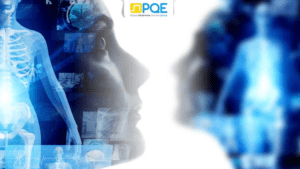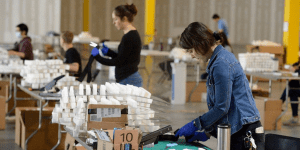
$1.2M Seed Round puts Maryland’s Pathotrak on Course to Disrupt $10B Food Safety Market with Rapid Testing Technology
June 9, 2020
Pathotrak, a startup focused on developing novel food safety tests, recently closed a $1.2M seed round that included investments from UM Ventures’ Maryland Momentum Fund, the University of Maryland’s (UMD) Dingman Center Angels program and a global life science company with a large food safety division. The seed round, in addition to a recently awarded NSF-SBIR Phase 1 grant, will enable Pathotrak to progress its lead product toward commercialization.
Securing startup funding of any kind during the COVID-19 pandemic has its challenges, but the excitement building around Pathotrak’s novel, rapid test for Salmonella, and E. coli in food secured its backers regardless.
Founded and led by former National Institute of Science and Technology (NIST) Guest Researcher and UMD Fischell School of Bioengineering Research Assistant Professor Dr. Javier Atencia, the company’s Next Generation Enrichment sample-prep kit has the potential to disrupt the consumer food safety and the food industry.
While the U.S. food safety track record is one of the best in the world, every year millions in the U.S. are hospitalized because of foodborne illnesses that result in billions of dollars in combined financial losses. According to the CDC’s most recent estimates, there are approximately 48M cases of foodborne illness every year, resulting in 128,000 hospitalizations and approximately 3,000 deaths (foodsafety.gov).
E. coli and Salmonella are major contributors to these U.S. foodborne illness challenges. According to the National Center for Biotechnology Information, E. coli “infections cause 73,000 illnesses annually in the United States, resulting in more than 2,000 hospitalizations and 60 deaths” resulting in over $400M in annual aggregated financial losses. According to the CDC, “…non-typhoidal Salmonella causes an estimated 1.2 million illnesses and 450 deaths in the United States annually, with 1 million of the illnesses resulting from contaminated food.”
For the food industry itself, the existing 18 hour minimum turnaround time for foodborne pathogen test results causes bottlenecks in the supply chain, reduces food shelf life and also increases food safety risks. Needless to say, this is a significant pain point for consumers and the food industry alike, and one that Pathotrak’s Next Generation Enrichment test kit is on the verge of solving.
The idea for the Next Generation Enrichment test kit germinated while Atencia was a Guest Researcher at NIST. In his role, Atenicia had established a strong track record of developing ideas and patenting them; he holds eight patents to date in his career, most of which are focused on microfluidics. One of Atencia’s microfluidics ideas caught the attention of a NIST colleague that saw its substantial potential.
“I developed this idea for separating pathogens from food. We used a chemical repellent that you put in contact with food. This leveraged the idea that the bacteria would respond to this stimuli by swimming, a technique which is called chemotaxis; then we proved in the lab that we could use this to separate pathogens from food faster so they can be detected faster,” Atencia continued.
”I was ready to move on to my next patent, but a new NIST Group Leader that came from the FDA said you have to pursue this because it is so important, it could solve a 100 year old problem in microbiology and food enrichment” he added.
From that point, Atencia disclosed his intention to pursue commercializing his patent to UMD and the school connected him to the Maryland Technology Institute (MTECH), which is part of the James A. Clarke School of Engineering and a national leader in entrepreneurship, innovation education and venture creation and is a pioneer in building successful university-company partnerships.
And thus, Pathotrak was born.
Pathotrak joined the MTECH incubator and went on to participate and graduate from the DC I-Corps and NSF I-Corps programs. MTECH and the I-Corps programs were game-changers for Atencia and Pathotrak.
“When I did my first I-Corps program it was like putting on new glasses and I saw things like I’d never seen things before. This changed everything,” stated Atencia. “I left my position at UMD last November and this recent seed round funding has given us a year plus runway allowing me to do it full time.”
Fast forward a few years and Pathotrak is nearing major milestones in getting its rapid foodborne pathogen test approved for use.
Put simply, Pathotrak’s Next Generation Enrichment sample-prep kit can potentially deliver pathogen test results six times faster than existing testing methods using less media and with the same accuracy levels.
“If you produce lettuce and you want to sell it and you sell a lot of it you have to test. If you take 25 grams of lettuce and there is one single salmonella or E. coli bacteria you cannot sell that lot. You have to hire a lab to test your products and the current Polymerase Chain Reaction (PCR) molecular methodology can take 24 hours to increase the bacteria to a capacity large enough to test,” stated Atencia.
The Next Generation Enrichment kit eliminates the need for sample enrichment as it separates the bacteria from the sample entirely. And instead of a farm and its supply chain having to wait 18-24 hours or even up to several days for results, they can receive the test data in just five hours with the same accuracy. For other industries, the reduction from 18-24 hours to five might not seem substantial; however, because the food industry depends on tight shipping timelines to maximize product shelf life, the difference is substantial from both a safety and financial perspective.
“We’ve talked to many people, obviously, about the benefits of faster testing. One lab we spoke to told us about their testing process. They receive trucks loaded with produce. The lab gets samples to test from the trucks and then the trucks sit in the parking lot for up to 24 hours, waiting. Think about the cost for fuel, truck rental costs at $50 an hour and refrigeration — that’s a lot of money saved right there by reducing the process to five hours,” stated Atencia.
“Now also think about food shelf life. 15% of U.S. produce is thrown in the garbage because it expires. Because of the extra time our test can create, we’ve estimated we can reduce food waste by 47%. Plus, this increased shelf life gives consumers more opportunity to purchase food products, especially the meats,” he added.
The food safety market is about $10B. Pathotrak’s Next Generation Enrichment Test kit is beholden to all FDA and U.S. Department of Agriculture (USDA) regulations but is approved and certified by AOAC International, the U.S. regulatory body for food safety products. Pathotrak is very close to applying for AOAC certification in produce; it will then apply for AOAC certification for meats at a later date. These segments of the food safety market represent approximately $2.3B of the total $10B food safety market. Once the application is submitted, AOAC typically renders its decision within six to nine months.
In preparation for certification, Pathotrak has built a strong manufacturing network to produce and assemble its disposable Next Generation Test kits to meet expected demand once its product receives certification. It has also started reaching out to labs and building potential client partnerships as it progresses through the AOAC certification process.
“It’s been amazing to hear from people in the industry that don’t even mention the issue with food testing time because they say it’s impossible to solve. They say it’s just impossible, and then I explain to them about enrichment and what our product can do,” stated Atencia.
“For food companies with small margins they have to move a lot of food fast to make money and some companies take safety risks because of this 24 hour test turnaround time. Based on the feedback we’ve received about our test, a lot of things are going to change for the better for food producers and consumers,” he added. “It’s really an exciting time for our company and the industry.”
By eliminating the need for enrichment in food testing and saving the supply chain nearly a day of delivery time, Pathotrak and its Next Generation Enrichment sample-kit test could significantly disrupt the $10B food safety industry. The company’s novel test kit has the potential to increase food shelf life and improve food industry profits all while reducing foodborne illness risks to food buyers across the U.S — a true “win-win” scenario.
- About the Author
- Latest Posts
Steve brings nearly twenty years of experience in marketing and content creation to the WorkForce Genetics team. He loves writing engaging content and working with partners, companies, and individuals to share their unique stories and showcase their work. Steve holds a BA in English from Providence College and an MA in American Literature from Montclair State University. He lives in Frederick, Maryland with his wife, two sons, and the family dog.






